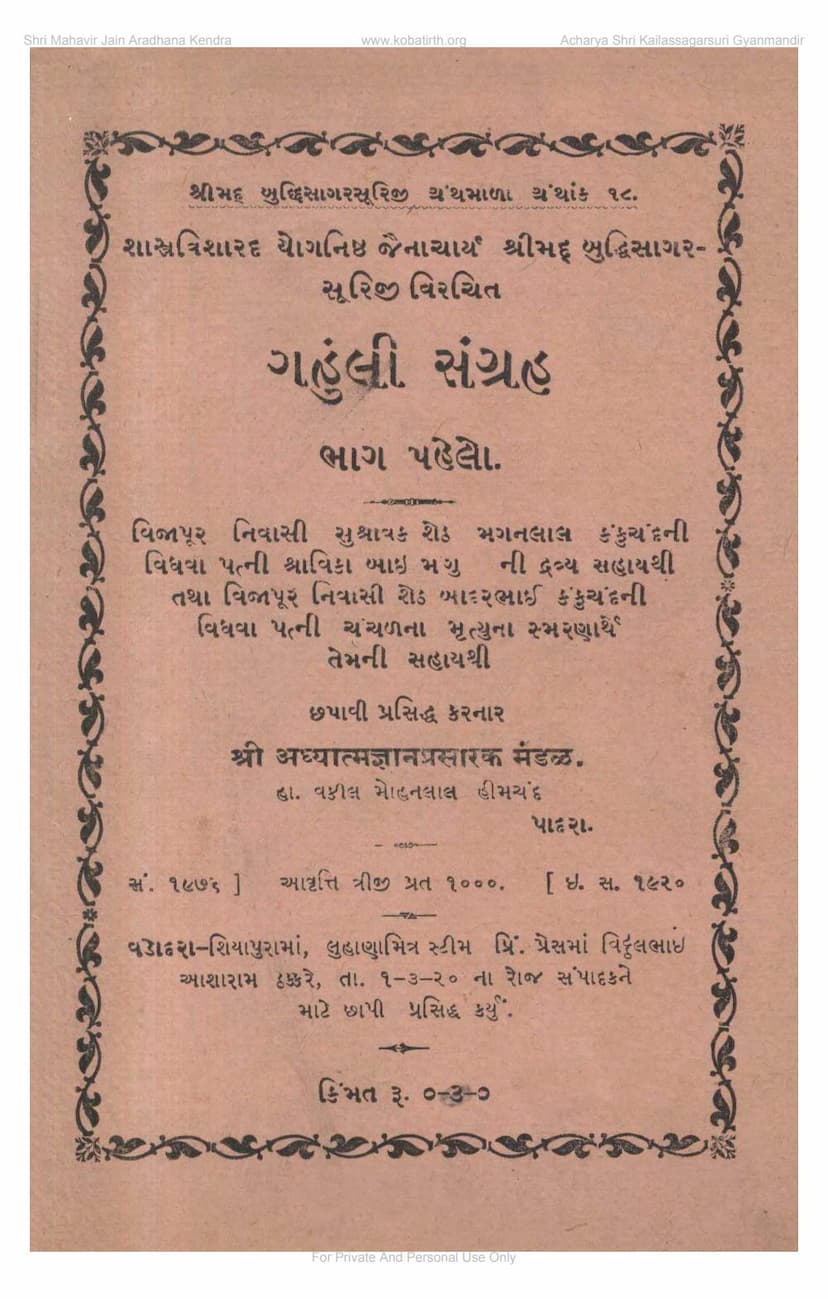Gahuli Sangraha Part 1
Added to library: September 1, 2025

Summary
The Jain text "Gahuli Sangraha Part 1" (ગહેલી સંગ્રહ ભાગ પહેલો) by Acharya Shrimad Buddhisagar Suriji, published by Shri Adhyatma Gyan Prasarak Mandal, is a collection of devotional songs and teachings, primarily aimed at Jain laywomen (Shravikas). The "Gahuli" format refers to lyrical compositions that are sung, often in a call-and-response or narrative style, with a focus on moral and spiritual instruction.
Here's a comprehensive summary based on the provided pages:
Overall Purpose and Content:
- The book is a compilation of "Gahulis" – devotional songs and moral teachings presented in a lyrical and engaging manner.
- It aims to impart ethical principles, spiritual wisdom, and guidance for a virtuous life, particularly for Jain women.
- The content covers a wide range of topics relevant to spiritual practice, ethics, and daily life within a Jain framework.
Key Themes and Subjects Covered by the Gahulis:
The Gahulis are categorized and address various aspects of Jain philosophy and practice:
- Guru Devotion and Teachings: Many Gahulis are dedicated to praising and learning from spiritual teachers (Gurus), particularly referencing Acharya Ravi Sagarji and Buddhisagar Suriji himself. They highlight the importance of following the Guru's guidance, understanding their teachings, and seeking liberation through their wisdom.
- Moral and Ethical Conduct: A significant portion of the text focuses on ethical guidelines for everyday life. This includes:
- Honesty and Truthfulness: Avoiding deceit, gossip, and speaking truthfully.
- Respect for Elders and Family: Honoring parents, elders, and maintaining harmonious family relationships.
- Avoiding Vices: Discouraging bad habits, gambling, drinking, and unethical behavior.
- Kindness and Compassion: Practicing compassion towards all living beings (Ahimsa).
- Contentment and Simplicity: Avoiding excessive attachment to material possessions and outward show.
- Modesty and Humility: Avoiding pride and ostentation.
- Spiritual Practices and Philosophy:
- Vairagya (Detachment): Emphasizing detachment from worldly pleasures and illusions, recognizing the transient nature of life and the body.
- The Nature of the Soul (Atma): Encouraging introspection and understanding the true self, distinct from the physical body and worldly attachments.
- Devotion to Tirthankaras and Jinavani: Praising the Tirthankaras and the sacred scriptures (Jinavani).
- Right Conduct (Achar): Detailing the conduct expected of devout lay followers (Shravakas and Shravikas).
- The Importance of Knowledge and Education: Encouraging learning and dispelling ignorance.
- Stages of Spiritual Progress: Alluding to concepts like different stages of spiritual development and liberation (Moksha).
- Specific Occasions and Practices:
- Guru's Arrival: Songs to be sung when a Guru visits a town.
- Initiation (Diksha): Songs related to the ceremony of monks taking vows.
- Paryushan: Special songs for the Jain festival of Paryushan, emphasizing fasting, repentance, and spiritual discipline.
- Daily Devotional Practices: Mention of meditating on specific deities or principles on different days of the week.
- Lunar Calendar: Songs related to the significance of different days of the lunar month.
- Praise of Acharyas and Learned Individuals: The text pays tribute to prominent Jain scholars and Acharyas like Ravi Sagarji, Buddhisagar Suriji, and Yashovijayji Upadhyay, highlighting their contributions to Jain literature and philosophy.
- Storytelling and Examples: Some Gahulis use allegorical stories or simple analogies to illustrate spiritual or moral points.
Structure and Style:
- The book is organized into numbered "Gahulis" (or "Gahuli"), each representing a distinct song or teaching.
- The language used is primarily Gujarati, written in a poetic and lyrical style, often set to specific ragas (melodies) mentioned for singing.
- The verses are designed to be easily understood and memorable, making them suitable for communal singing and recitation during religious gatherings and discourses.
Sponsorship and Publication:
- The book was published with financial support from devoted lay followers, such as the widow of Seth Maganlal Kankuchand and the widow of Seth Bhaderbhai Kankuchand from Vijapur, in memory of their deceased wives.
- The publisher is Shri Adhyatma Gyan Prasarak Mandal, located in Padra.
- The third edition was published in 1920 CE (Samvat 1976).
Significance:
- "Gahuli Sangraha Part 1" serves as a valuable resource for Jain education, particularly for women, offering practical guidance for spiritual growth and adherence to Jain principles through accessible and devotional songs.
- The republication of the work indicates its popularity and perceived utility for the Jain community.
- The inclusion of various learned individuals and their teachings underscores the rich tradition of Jain scholarship and devotional literature.
In essence, "Gahuli Sangraha Part 1" is a collection of melodious and didactic songs that encapsulate essential Jain teachings, emphasizing ethical living, spiritual detachment, devotion to Gurus, and the path to liberation, making it a significant work for spiritual edification.